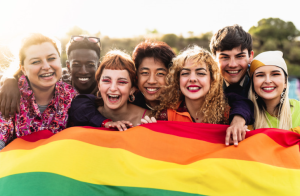 You might have noticed that things have gotten…a little more colorful in the world this month. June is Pride month, a month dedicated to celebrating and honoring the history, contributions, and joy of the LGBTQIA+ community. Pride takes place in June to honor the June 28th anniversary of the Stonewall Uprising, a gay liberation protest by LGBTQIA+ individuals, led by transgender women of color, who were regularly experiencing violence discrimination for their sexuality and/or gender expression.
You might have noticed that things have gotten…a little more colorful in the world this month. June is Pride month, a month dedicated to celebrating and honoring the history, contributions, and joy of the LGBTQIA+ community. Pride takes place in June to honor the June 28th anniversary of the Stonewall Uprising, a gay liberation protest by LGBTQIA+ individuals, led by transgender women of color, who were regularly experiencing violence discrimination for their sexuality and/or gender expression.
Pride is a month of celebrating queer culture, but it is also about honoring the needs and rights of all LGBTQIA+ people. Since we’re all about crafting sustainable plans to support our mental health, we want to take today to focus on how mental health struggles directly impact our LGBTQIA+ neighbors. According to Mental Health America data from 2022, “LGBTQ+ people are twice as likely as non-LGBTQ+ people to have a mental health condition and continue to show disparities in mental health, even though they are more likely to use mental health services.” Being LGBTQIA+ is not a mental illness, however our queer neighbors are at higher risk of many mental health conditions due to their experiences of increased stigma, trauma, and violence as a result of their identity, lack of housing and job protections, and lack of access to affirming resources and information, among other factors.
Whether you personally identify as a member of the LGBTQIA+ community or not, there are things you can do during Pride month and beyond to learn,
- Seek and share resources: We are lucky to live in a moment of increased access to online resources (which is probably why you’re reading this newsletter!). Mental Health America has put together a comprehensive list of resources for everything from coming out in adulthood, to asexuality, to supporting queer youth. The Trevor Project puts out one of the most comprehensive reports on LGBTQIA+ youth and mental health each year. You can find their most recent 2022 report here.
- Find a LGBTQIA+ affirming therapist: Resources like Pride Counseling and the National Queer & Trans Therapists of Color Network can help you find a therapist that works for you or a loved one. Need help in figuring out if a therapist is right for you? Check out our tips on our blog.
- Join the fun: Joy and community are two important parts of supporting our mental health. Pride is many things, but among them it is a celebration of the magic of LGBTQIA+ people. Join in by attending a Pride event, volunteering, or sending a donation.
- Big events not your thing? Try digging into a book at home: There have been so many amazing books released by LGBTQIA+ writers and researchers that deal with topics of mental health. Pick one up at your local library or bookstore! Some of our favorites? The Collected Schizophrenias by Esmé Weijun Wang, The Remedy: Queer and Trans Voices on Health and Health Care edited by Zena Sharman, and Headcase: LGBTQ Writers & Artists on Mental Health and Wellness edited by Stephanie Schroeder and Theresa Theophano. Have your own favorite? Reply to this email and let us know!
And remember, if you need assistance finding care that is respectful of your sexual orientation and gender identity, we would love to talk to you. Just dial 844-YOU-OKAY. to reach our free, confidential support line for Tampa Bay. We can help you find affirming local resources to support you at any stage of your journey.
We know that Tampa Bay only thrives when all of our neighbors feel safe and supported to thrive themselves. We are with you every step of the way, and wish a safe and happy Pride to those celebrating.
We’ll see you next month,
Your Team at Tampa Bay Thrives